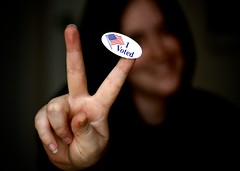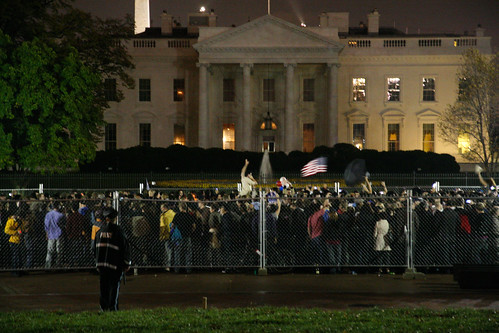The Obama Moment – Making and Documenting Historical Memory
Posted in The Gnovis Blog
 Yesterday was the first Wednesday of the month, which means I was supposed to be continuing my thesis series, focusing this time on the writing of the thesis proposal — but, even after taking an extra day, I can’t bring myself to write about anything other than what I saw on the streets of DC on Tuesday night. Since this is gnovis, though, I’ll try to turn off my emotional gushing and say something of academic worth, by focusing on digital media and collective memory.
Yesterday was the first Wednesday of the month, which means I was supposed to be continuing my thesis series, focusing this time on the writing of the thesis proposal — but, even after taking an extra day, I can’t bring myself to write about anything other than what I saw on the streets of DC on Tuesday night. Since this is gnovis, though, I’ll try to turn off my emotional gushing and say something of academic worth, by focusing on digital media and collective memory.
I’ll begin with a question. The pivotal moments in American history are, in our collective memory, linked most vividly to specific images, soundbites, and quotes, which act as a common reference point for summoning forth all of the complexity of that moment – "Four score and seven years ago…," "Ask not what your country…," "One small step for man…," and so on.
So in 2008, in a hyper-mediated era, what will be the media-bites that come to define this moment, in our collective memory? How will we choose from all this stuff?
Great Speeches and Big Media
There are two fairly obvious answers. First, the examples I gave above suggest that history favors great speeches, and Obama is an amazing speaker in both style and substance, so in all likelihood his speech from Grant Park will feature prominently in our collective memory.
Second, despite all the changes that the Internet has brought to political media, television is still very much the gatekeeper, particularly for large events. So the choices made by the major media outlets over the next few weeks, as they choose which soundbites to play over and over, will further determine the details of our collective memory.
Personal Portable Media and the Individual
However, I’m not quite comfortable suggesting that, a generation from now, Tuesday night will be remembered as nothing more than the night that Barack Obama said "America, we have come so far. We have seen so much. But there is so much more
to do." I danced that night in the streets of DC with thousands of strangers, and woke up to inbox full of links to their instant memories. Maybe I’m just being stubborn, but I can’t quite accept that the
thousands of hours of footage from handicams and camera phones, now
posted on YouTube, and the millions of photos on Flickr, don’t count
for something in our collective memory.
But how will they count? Maybe this is just the tired information overload question, recast in the light of a particularly significant historical moment. However, at least in part, it is about the way that digital media allows us to move away from "collective memory" and towards "collections of memories," in a way that historians have already been trying to do.
I’m thinking a bit of Tom Brokaw’s The Greatest Generation and the way that so much historical work, right now, is about documenting the stories of passing generations, on an individual basis, while they are still alive. I think this reflects two things: a growing interest in the individual narrative, or sets of individual narratives, as a way to understand history, and the failure of earlier media to capture those narratives in the moment. So we see a scramble to record individual memories while the individuals are still living.
The Self-Documenting Generation
Among today’s younger generations, however, this isn’t even an issue, because we document ourselves. When I’m 85, it’s highly unlikely that a historian will come to me to record my stories for future generations. Maybe she’ll ask me for some links, or for access to my harddrive, but in all likelihood she’ll just wade through digital archives of my blogs, online articles, videos, and so on. And if she comes looking for me and learns that I’d already passed away, she’ll still be able to study me, through my digital footprint.
If, however, she should happen to ask me about the day that Barack Obama was elected, I’ll probably just point her to this post , by my partner Emily, which captures almost everything I would ever want to say. Emily, who is not a blogger, woke up on Wednesday morning, sat at the computer, and wouldn’t talk to me until she’d finished documenting the previous night.
"What I saw last night – all of us rallying together to celebrate the victory of a man we all believe in, and to celebrate the fact that we now live in a country that elects itself a black president – elicited a feeling of community I have never felt before in my life." <read it >
I don’t want to speak for her, but I suspect that, at some level, Emily was motivated by the sense that her personal experience needed to be documented and shared, and that she had something to add that all the other bloggers and vloggers and photographers hadn’t already shared. I had the same urge, but was too caught up in everything to make sense of it, so I was incredibly relieved that Emily was able to do so on our behalf. Ensuing emails and Facebook comments suggest that many feel the same way.
I feel that this is a markedly different way of thinking about personal experiences and history – we write down our thoughts in the moment not because we want to save them for ourselves, in a diary, but because we want to share them with others, and because we know others want us to share them.
Cutting to the chase
OK, so the gist of what I’m saying here is that digital media allow our generation to self-document historical events, adding to the "collection of memory" instead of simply consuming "collective memory."
Until very recently, there has been a structural gap between the collective memory of history, constructed by the media and other institutions, and the personal narrative of history, residing in the minds of individuals. The work of many historians was to interview passing generations, extract the personal narratives, and then organize them into collections of memories in order to, in effect, break through that gap.
Now, the gap has been largely eliminated, as individuals can self-document, self-publish, and self-organize their collections of memories. This will, of course, create new challenges for historians, but at least the memories are no longer trapped in our fragile, organic minds, unrecorded.
History was made throughout this election cycle, in uncountable ways, but certainly including the use of digital media to connect new voices to new audiences, to organize campaign actions, and to register and mobilize new voters.
History was most certainly made on Tuesday, not only by the most significant presidential pick in my lifetime, but by the use of digital media to monitor lines at polling places, to say "I voted" to the world, to aggregate early projections, and to coordinate the spontaneous revelry in DC on U St, 18th St, and outside the Whitehouse.
And, looking ahead, history will continue to be made in the ways that we use digital media to document this historical event, making history into History.
Back to the question
But enough about what I think; what do you think about my original questions, which I never quite answered:
So in 2008, in a hyper-mediated era, what will be the media-bites that come to define this moment, in our collective memory? How will we choose from all this stuff?

